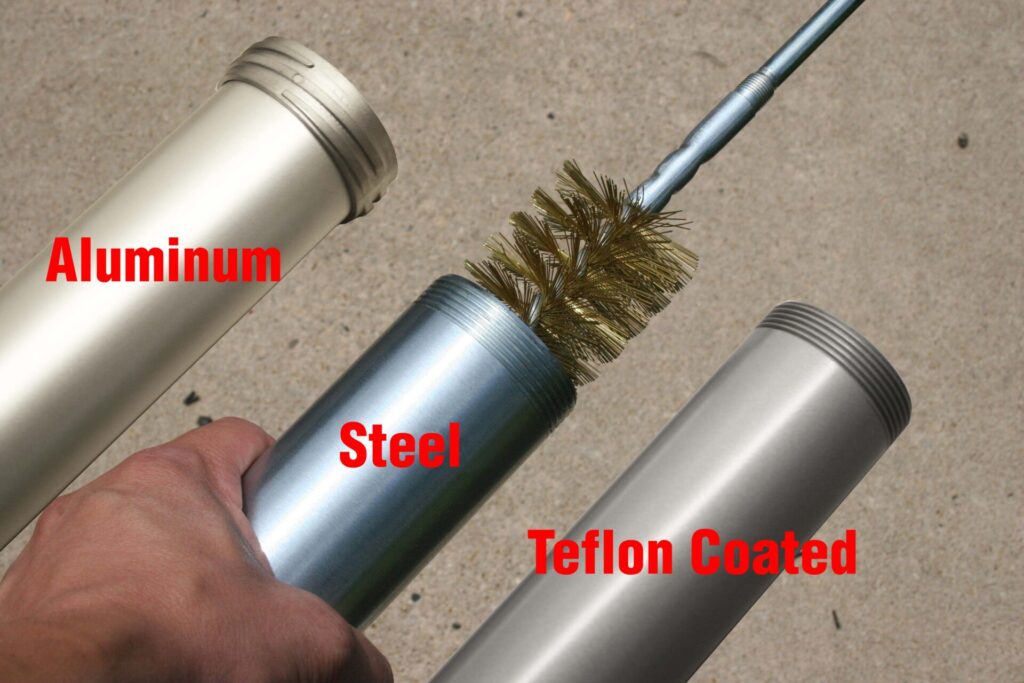Barrels – So what? Does it really make a difference?

It all depends on what you want to achieve with your tool. Consider:
1. How much do you use the tool? Is it something you make a living with or is it something you use only use on occasion?
2. What type of material are you dispensing; Is it sticky, thick, thin… those types of characteristics play a part.
3. The material packaging you are dealing with; Is it packaged in pails or is it in foil skin (sausage) form?
Some of the benefits of each barrel:
Steel Barrel:
• Durable barrel, ideal for construction environments. Heavy loads can be placed on top of the barrel and it won’t deform or dent. (But, if a barrel does dent see below for how to remove a dent.)
• Will hold true round shape over the entire length of the barrel. This improves the piston’s ability to function and consistent dispensing through the entire length of the barrel.
• Easy to clean. With a steel barrel you can use the 800-G01 or 800-G02 Barrel brush to clean the inside surface of the barrel. A clean barrel improves the piston’s ability to function and increases its life.
Steel Barrel w/Teflon Inside Coating:
• Same strength benefits of a steel barrel
• Surface coating reduces friction between the barrel and piston making it easier to dispense.
• Nonstick surface makes it easy and quick to clean. Flush the tool with solvents and run a rag through the barrel. You cannot use an 800-G01 or -G02 barrel brush. The brush will remove the Teflon surface. If the Teflon surface is removed… the barrel can be used as regular a Steel Barrel.
Aluminum Barrel:
• Lighter in weight, generally assembled on lower cost tools.
• Better for sausage or low volume bulk use.
• Won’t rust.
• Be careful for the barrel is easy to dent, you can squeeze the barrel with your hand and possibly change the shape making it more difficult for successful dispensing.
• Most aluminum barrels are extruded and therefore there are slight changes in the shape of the barrel over the length of the barrel, causing the piston to work harder.
Clear Plastic Barrel:
• Great visual of material being dispensed.
• Like the Aluminum Barrel the barrel is extruded. The diameter can be inconsistent over the length of the barrel. This makes it difficult for the piston to function correctly through the entire length of the barrel.
• Brittle, will crack when dropped or crushed.
• Difficult to clean if material is sticky.
• Solvents in the material or for cleaning can soften the barrel surface or make it more brittle. (Simple yellowing of the barrel tells us the barrel structure has been changed.)
So, does this help you select and/or understand the background in steel, aluminum, and plastic barrels.
Engineering Tid-Bit: Fixing a Dented Barrel
When a barrel is dented and you can see the dent on the inside of the barrel it causes premature wear on the piston and ultimately material will tend to blow past the piston. To fix a dent like that get a round steel rod long enough to fit inside the gun barrel, maybe 1” in diameter. Secure the steel bar in a vice and slide the barrel on the steel rod to where the dent is in contact with the steel rod. Then take a hammer an tap the outside of the barrel around the dent. The steel rod will flatten the dent on the inside of the barrel and make the barrel as good as new.
You can fix dents in the threaded area also this way. It works on steel and aluminum barrels.